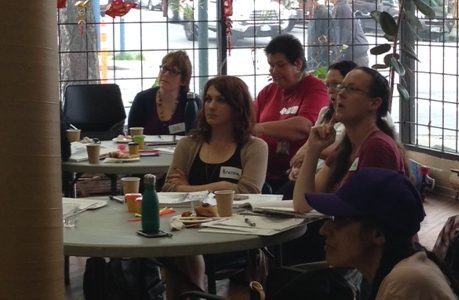DTES Peer Reference Group brings a lot to the table
Peers bring lived experience to 2nd Generation Strategy
The Second Generation Strategy is redesigning health services in the Downtown Eastside (DTES) in order to improve the experience and health outcomes of clients. The strategy was built on years of engagement – from community partners, clients, physicians and staff. When it came time to implement the strategy, they knew how critical it would be to continue to get client input, so they created the DTES Peer Reference Group.
The objective was to bring the diverse voices of clients with lived experience in the community and who have used VCH services. The group has been ongoing since early 2016 and will continue until the end of 2017 as Second Generation Strategy initiatives and work are being implemented in the community.
“The Peers have provided feedback on our various initiatives and have helped us make recommendations as well as identify solutions,” says Breann Specht, Leader, Community Engagement. “Their many contributions have been invaluable as we have moved forward with our work in the DTES to better understand what our clients in the community need.”
How do Peers participate?
Peers participate in focus groups and also sit on various working groups related to various initiatives ranging from harm reduction, client pathways of care, DTES Connections Clinic, and food. “The Peer Advisors on the food committee had experience with the quality of food from various food service providers in the neighbourhood,” said Andrew MacFarlane, Operations Director, Vancouver Community. “Most of the people on the committee wouldn’t have that ‘real world’ experience and be able to provide that same input.” It’s also been a positive experience for our Peer Advisors as they’ve received training and made professional connections to support future employment.
How does the DTES Peer program work?
Peer leadership and participation is a cornerstone of the non-profit community in the DTES and VCH wanted to learn from this to strengthen our own programs. So, aside from the Peer Advisory Group, Peers with lived experience will be embedded within many DTES programs and services. These Peers are hired, managed and supported by RainCity Housing and Support Society in conjunction with our management teams. “In addition to RainCity’s vision and stability, they have a proven track record of being an innovative and collaborative partner. They also have peer employment embedded in every level of their organization,” says Andy Day, Director and Program Lead for Primary Care, Vancouver Community. “It has worked well for us and for the Peers.”
Erika Weikle is a Peer Care Coordinator with Vancouver Community’s Assertive Community Treatment (ACT) team and knows firsthand about being a Peer:
“Being a Peer Support Worker brings lived experience to the care teams. We bring a fresh perspective to what might be going on with a client,” says Weikle. “It also gives us meaning and purpose to be part of something that is helping others.”
There have been some challenges for the peers; for example, not all peers in the DTES have access to email or even a phone. So, sending them material ahead of time or alerting them to meeting times can be difficult.
But despite the challenges, the feedback from directors and managers has been positive. One manager had this to say about the Peer sitting on her committee,
“It’s great working with a Peer on a decision-making group. She spoke to her experience in the DTES which was really the perspective the group needed to hear.”
For more information on the DTES Second Generation Strategy, go to our web site at http://dtes.vch.ca/secondgenerationstrategy/.

